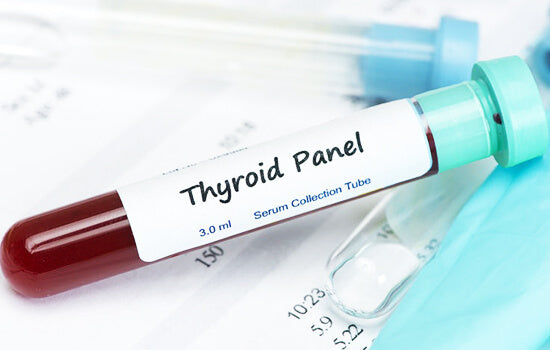Myetin® is a groundbreaking nutritional supplement combining the nutritional benefits of high dose D-Biotin with the energy producing power of NAD+ to support better nerve health over time.
Myetin® contains 150mg of D-Biotin in each dose and is recommended to be taken twice daily, giving 300mg as the daily dosage.
With this much intake of biotin, some research has suggested that certain medical tests, such as those given for thyroid function, may be impacted.
Here is more information on the science behind the news:
Clinical Study Results
A recent clinical study study of high-dose biotin and thyroid testing revealed that thyroid function tests may show falsely high or falsely low among those taking high doses of biotin.
The case presented of a 47-year-old male patient with MS whose thyroid test initially showed severe hyperthyroidism, along with thyroid autoantibodies suggestive for Graves’ disease.
However, two weeks after withdrawing biotin, the tests no longer indicated severe hyperthyroidism. This biotin-induced interference was seen not only on thyroid tests; but also, on certain other immunoassays.
The end result? Scientists ultimately titled the study “Fake News” because depending on the type of test being administered, biotin can result in falsely high or falsely low results on a number of tests, in addition to thyroid tests.
More Information On High Dose Biotin
Biotin supplementation has increased significantly among consumers, to the point that the FDA has how offered guidelines for consumers, health care providers, lab personnel and lab test developers regarding potential interference between high doses of biotin and certain lab tests.
The agency notes that biotin in blood or other samples taken from those taking high levels of biotin can result in clinically significant incorrect lab test results. The results of certain tests can be either falsely high or falsely low.
Incorrect test results may result in misdiagnosis or inappropriate patient management. Many patients and physicians may be unaware of potential biotin interference in lab tests, and many patients may not even mention taking biotin as a result.
The FDA states that those taking high doses of biotin should talk to their doctor. If a person taking biotin is concerned about test results, he or she should speak to their physician regarding potential biotin interference.
This is true of thyroid tests, or any other medical tests which rely on biotin/streptavidin interactions.
It is important to note that other than potentially affecting certain test results which rely on biotin/streptavidin interaction, biotin in high doses has no known adverse effects, and, as a water-soluble vitamin, excess amounts not needed by the body are simply excreted.


